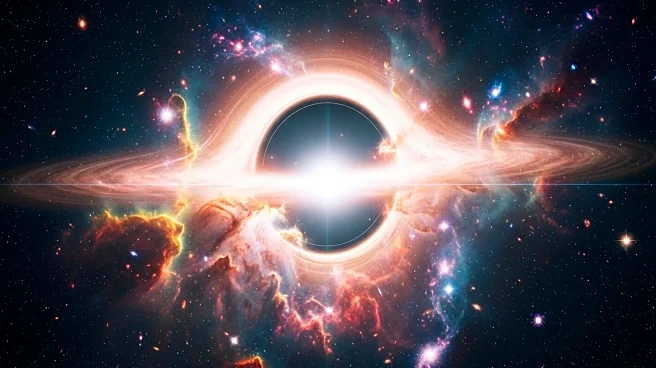What's Happening?
Scientists have reported a 90% probability that an exploding primordial black hole could be detected within the next decade using current telescopes. This potential discovery would confirm the existence of primordial black holes, which are theorized to have formed shortly after the Big Bang, approximately 13.8 billion years ago. The concept of exploding black holes was first introduced by Stephen Hawking, who suggested that black holes emit thermal radiation, known as Hawking radiation, as they lose mass. This process is believed to culminate in an explosion. Smaller black holes, which emit more Hawking radiation, are more likely to be detected during these explosive events. A new theoretical model suggests that if primordial black holes possess a small, dark electric charge, their explosions could occur about once every ten years, rather than once per 100,000 years. These explosions may release known particles such as electrons and quarks, as well as potential particles beyond the standard model, including dark matter candidates.
Why It's Important?
The potential detection of an exploding primordial black hole would have significant implications for particle physics and cosmology. It would provide direct evidence of Hawking radiation, a phenomenon that has yet to be observed, and offer insights into the early universe's conditions. Confirming the existence of primordial black holes could also enhance our understanding of the universe's composition, including the elusive dark matter. This discovery could lead to advancements in theoretical physics, potentially unveiling new particles and forces that extend beyond the current standard model. Such findings would not only deepen scientific knowledge but could also influence future research directions and technological developments in astronomy and physics.
What's Next?
If an exploding black hole is detected, it would likely prompt a surge of scientific research and observation efforts. Astronomers and physicists would aim to analyze the data collected from such an event to validate existing theories and explore new hypotheses. The detection could lead to the development of more advanced telescopes and observational technologies to further study these phenomena. Additionally, the scientific community may focus on identifying other potential sources of Hawking radiation and exploring their implications for our understanding of the universe. The findings could also stimulate discussions on the role of primordial black holes in cosmic evolution and their potential impact on galaxy formation and structure.









